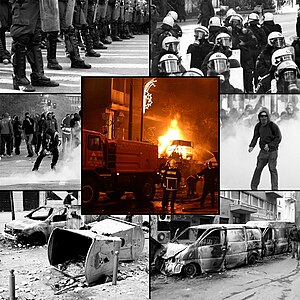
Back شغب اليونان 2008 Arabic Масови безредици в Гърция (2008) Bulgarian Revolta a Grècia de 2008 Catalan Nepokoje v Řecku 2008 Czech Urolighederne i Grækenland 2008 Danish Ausschreitungen in Griechenland 2008 German Ταραχές του Δεκεμβρίου 2008 στην Ελλάδα Greek Revuelta en Grecia de 2008 Spanish 2008ko Greziako istiluak Basque Kreikan mellakat 2008 Finnish
| 2008 Greek rebellion | |
|---|---|
 Clockwise, from top left: riot police face protesters; police move in to contain rioting civilians; a protester defies police; burned-out vans; an abandoned barricade; and protesters retreat from tear gas | |
| Date | 6 December 2008 — 17 January 2009 |
| Location | Greece |
| Caused by |
|
| Goals |
|
| Methods |
|
| Resulted in | Two special guards found guilty |
The 2008 Greek rebellion started on 6 December 2008, when Alexandros Grigoropoulos (Greek: Αλέξανδρος Γρηγορόπουλος), a 15-year-old Greek student, was killed by a special officer[1] in Exarcheia district of central Athens.[2] The killing of the young student by police resulted in large protests and demonstrations, which escalated to widespread rioting, with numerous rioters damaging property and engaging riot police with Molotov cocktails, stones and other objects. Demonstrations and rioting soon spread to several other cities, including Thessaloniki, the country's second-largest city, and international cities in solidarity. Newspaper Kathimerini called the rioting "the worst Greece has seen since the restoration of democracy in 1974".[3]
While the unrest was triggered by the shooting incident, commentators[4][5][6] described the reactions as expressing deeper causes as well, especially a widespread feeling of frustration in the younger generation about specific economic problems of the country (partly as a result of the global economic crisis), a rising unemployment rate among the young generation and a perception of general inefficiency and corruption in Greek state institutions.[7][8][9]
- ^ "POLICE TRIAL Two indicted over teen shooting". Kathimerini. Archived from the original on 16 June 2009. Retrieved 9 March 2010.
- ^ "More riots in Greece over fatal police shooting of teen". USA today. 7 December 2008. Archived from the original on 10 December 2008. Retrieved 9 December 2008.
- ^ Christofer, Kat (8 December 2008). "Athenian democracy in ruins". The Guardian. UK. Archived from the original on 10 December 2008.
- ^ Dalakoglou, Dimitris (January 2011). "From Ruptures to Eruption: A Geneaology of the December 2008 Revolt in Greece". Revolt and Crisis in Greece. Archived from the original on 13 March 2022. Retrieved 11 April 2016.
- ^ "Explainer: Why is there unrest in Greece?". CNN. 10 December 2008. Archived from the original on 17 December 2008. Retrieved 22 December 2008.
- ^ Dalakoglou, Dimitris. "The Crisis Before "The Crisis"". Social Justice. Archived from the original on 4 September 2021. Retrieved 11 April 2016.
- ^ "Behind the protests spreading across Greece". Economist. 9 December 2008. Archived from the original on 15 December 2008. Retrieved 12 December 2008.
- ^ "In Greece, a crisis decades in the making". International Herald Tribune. 11 December 2008. Archived from the original on 12 December 2008. Retrieved 12 December 2008.
- ^ Dalakoglou, Dimitris. "Introduction in Revolt and Crisis in Greece". Revolt and Crisis in Greece. Archived from the original on 13 March 2022. Retrieved 11 April 2016.